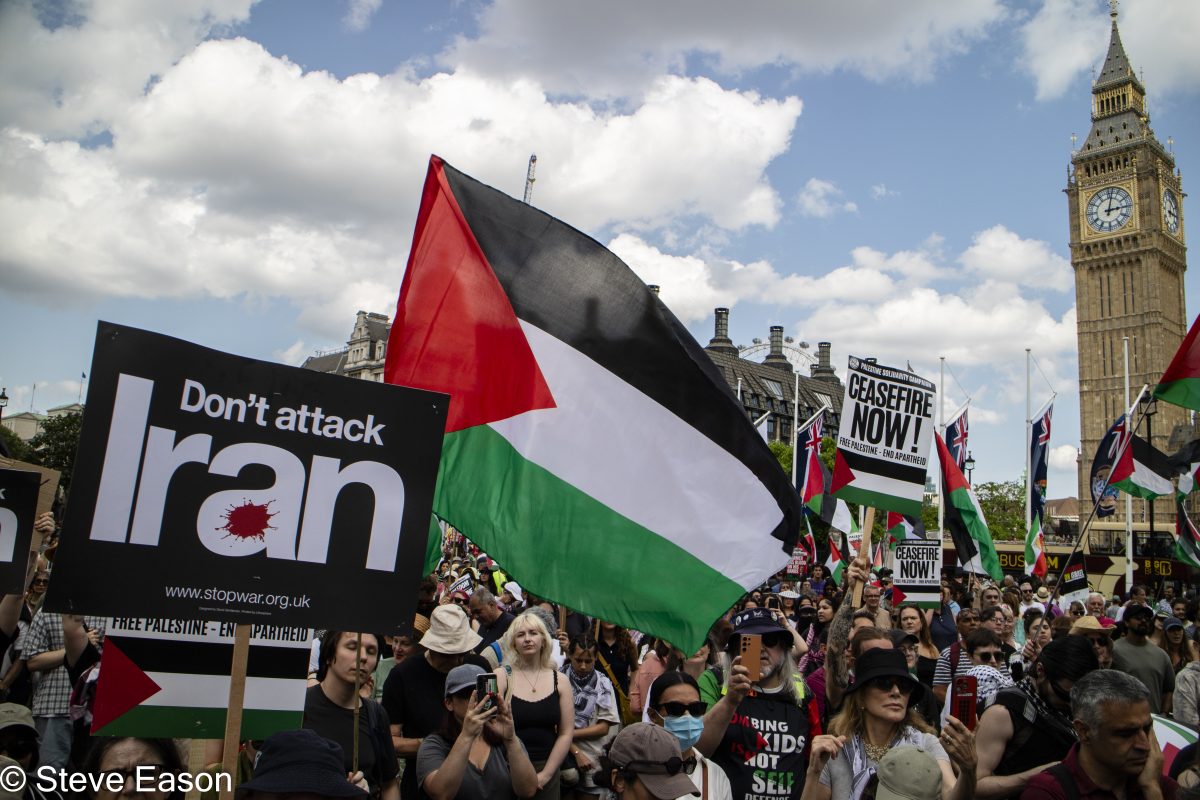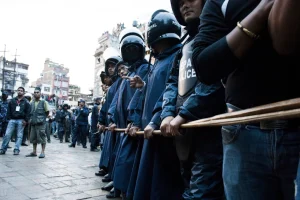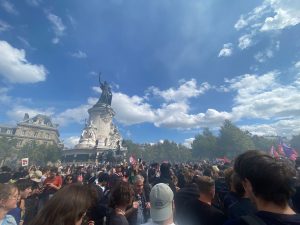
Israel’s new barbarity
Colin Wilson •Israel began missile strikes on Iran on Friday. Colin Wilson looks at the background to the attacks and the rationale behind them, and Starmer’s response.
To understand the strikes we need to begin with the big picture – that the Middle East is strategically important for any country seeking influence in the world because it has a major share of global oil reserves, and oil is one of the most important commodities in the capitalist economy, vital to everything from transport to production of plastics. The US doesn’t need Middle Eastern oil for itself – it’s a net exporter of both crude oil and refined products. But maintenance of US influence in the region is crucial when it comes to competition and conflict with China.
China needs to import most of its oil, and Chinese demand for oil has increased at least six-fold since the start of the century. In that period China has acted to diversify where it sources oil and the import routes it uses, so as to guarantee its supply. Twenty years ago Saudi Arabia was its main supplier, with Russia at number four – now Russia is at number one, but about 40% of China’s oil still comes from the Middle East.
The United States funds Israel – to the tune of almost $18 billion in 2024 – to act as its proxy in the region, its guard dog. As former US Secretary of State Alexander Haig put it, “Israel is the largest American aircraft carrier in the world that cannot be sunk, does not carry even one American soldier, and is located in a critical region for American national security”
When it comes to Middle Eastern oil, Iran presents a challenge to US interests. Until 1979, Iran was a key US ally in the region, alongside Israel. An authoritarian regime regularly used torture and thousands of secret police against dissidents. After the Islamic Revolution of 1979 Iran ceased being a US proxy – a major shock to US power in the same decade that it experienced defeat in Vietnam. Iran today is a key member of the ‘Axis of Resistance’, a coalition of groups including Hamas, Hezbollah and Ansar Allah (the Houthis) in Yemen, which seek to oppose US and Israeli influence in the region.
The US government, while needing to maintain its influence in the Middle East, wants to move on to concentrate on opposing China, and so it has sought to reach diplomatic agreements with key players. In 2015, for example, the US – along with China, Russia and the EU, at that time including Britain – signed a deal with Iran, which agreed to restrict its nuclear facilities in return for sanctions relief. Trump took the US out of that deal in 2018, but in 2020 the US, in his first term, signed the Abraham Accords, in which the United Arab Emirates and Bahrain recognised Israel’s sovereignty, followed by a similar deal with Morocco, which recognised Israel in exchange for US recognition of its claim to Western Sahara. The US was about to begin talks with Iran about its nuclear capabilities – scheduled for Sunday – when Israel launched its attack. Negotiated settlements in the region fit Trump’s agenda in several ways. In his 2024 election campaign he committed to ending US involvement in foreign wars, he regards himself as an expert dealmaker and he is eager, absurdly enough, to be nominated for a Nobel Peace Prize.
US-backed negotiations in the Middle East have at no point, however, included movement towards a Palestinian state. The major exception in a US policy of winding down Middle East involvement through negotiated agreements is of course America’s support for Israel. Israel exemplifies the other side of Trump’s psychology – his belief that political and ethical questions are less important than who has power. Trump is personally erratic, but his personality reflects a longer-standing ambiguity about American policy in the Middle East – they would like to reduce their involvement, but they can’t abandon Israel, not even an Israel moving further and further to the right and threatening to destabilise the region.
This inconsistency showed itself at the start of the second Trump term, when he brokered a ceasefire in January, only to stand by as Israel broke the ceasefire in March and continued its genocide in Gaza. We saw this ambiguity on Friday. It seems clear that Trump knew the attack was coming, or at least possible – on Thursday he had allowed US military families to leave the region. But when it happened, Secretary of State Marco Rubio initially distanced the US from it, stating that ‘We are not involved in strikes against Iran’. While a military response was not the preferred solution, then, they could live with it. On Friday afternoon, Trump switched tack again, rushing to associate himself with the attack, claiming that he had given Iran a 60-day deadline to make a deal, they had failed to meet that deadline – Sunday’s scheduled negotiations now forgotten – and that Israel had total US support.
Whatever these inconsistencies in US policy, however, there is no sign of any meaningful limits being placed on American support for Israel. A skilled and experienced operator like Netanyahu knows exactly how to take advantage of the situation to take forward the agenda of his coalition government. That includes the creation of a ‘Greater Israel’ as advocated by Finance Minister Bezalel Smotrich, a territory which would include Gaza and the West Bank and involve further expansion in a process of active colonisation. The Balkanisation of Gaza, the starvation of its population and the declaration in May of 22 new West Bank settlements are all part of this agenda, as are attacks on the ‘Axis of Resistance’, including on Iran.
The missile strikes on Iran also suit Netanyahu’s domestic agenda. It was only on Thursday, the day before the missiles launched, that the Knesset, the Israeli parliament, voted on whether or not to dissolve itself and end the coalition government. The issue here was the exemption of Haredi (“ultra-orthodox”) men from military service – an issue which is a flashpoint in the growing social divide in Israel between those supporting a secular version of Zionism and those like Smotrich and National Security Minister Itamer Ben-Gvir who support right-wing, religious policies. War with Iran delays any reckoning with those divisions and undermines opposition to Netanyahu – opposition leader Yair Lapid has praised the attacks.
War also diverts international attention from the ongoing horror of events in Gaza. With Iran at the top of the news agenda, Israel faces less scrutiny as it cuts off internet connections to Gaza and its troops kill Palestinians as they gather to pick up food aid. A UN conference on a two-state solution planned for next week has been postponed, delaying – to Israel’s advantage – the recognition of a Palestinian state proposed by French president Macron. Here in Britain, Keir Starmer and David Lammy, who sanctioned Smotrich and Ben-Gvir only a few days ago, have now fallen back into line. Starmer states that Britain is ‘moving assets to the region, including jets, and that is for contingency support’ – that is, support of Israel. At a time when resources are badly needed for the NHS and other public services, Britain’s rulers are spending billions to bend the knee to America and its rabid watchdog in the Middle East, to signal that they may have wavered but remain, in the end, complicit with imperialist genocide. We must now recommit ourselves to street demonstrations, campaigning for Apartheid Free Zones, protests at arms factories and more if we are to prevent the Middle East sinking into barbarity.




1 comment
Refreshingly informative and clearly researched journalism – thanks Colin.